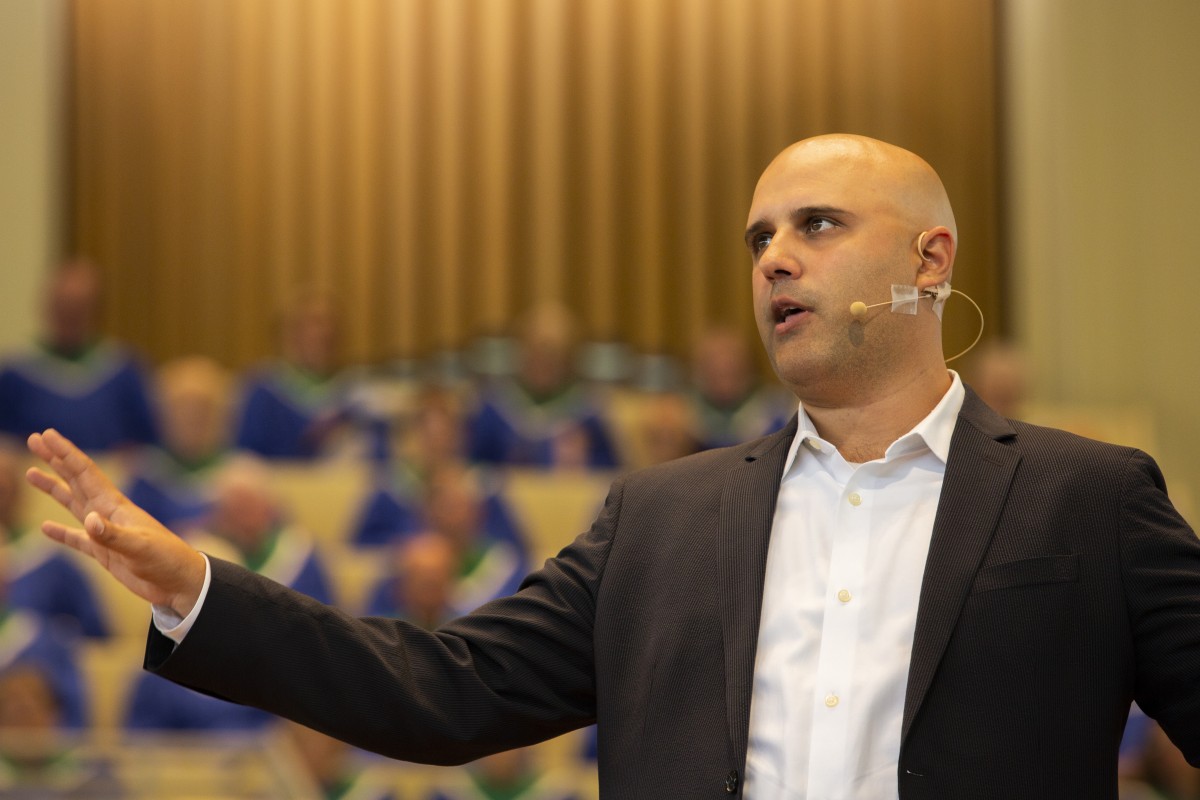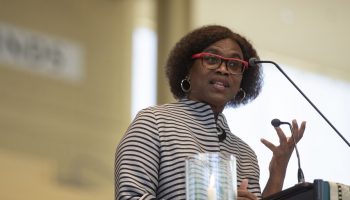Mother Teresa was celebrated throughout the world. Why?” said the Rev. Akash “Skye” Jethani. “She had no possessions, no authority, little education — but she inspired everyone not by what she did in the world, but how she saw the world.”
Jethani was preaching at the 10:45 a.m. Sunday morning worship service on July 29 in the Amphitheater. His sermon title was “But Now I See,” and the Scripture reading was Matthew 26: 47-56, the betrayal and arrest of Jesus.
“I would like to begin with a song, but I can’t sing and I have a cold,” Jethani said. “But let’s sing the first verse of ‘Amazing Grace.’ ”
The congregation sang: “Amazing grace, how sweet the sound that saved a wretch like me. I once was lost but now I’m found, was blind but now I see.”
Jethani said that Mother Teresa’s sisters would go to the train station in Calcutta every morning to pick up the people so sick that their families abandoned them.
One day she took care of a man who was dying; he even had maggots eating his flesh. She cared for him all day, and in the later part of the afternoon, he opened his eyes, thanked her for the care, and died.
At dinner that night, Mother Teresa was smiling, and a sister asked her why. She said that the day had been a blessing because she had been able to care for the dying Christ.
“Where people saw ragged street children, she saw the children of God,” Jethani said. “Where people saw a poor, dying man, she saw a savior. When a president came to visit, she saw a person in need of God’s grace.”
How we see determines how we act in the world, he said.
“That is one of the challenges in the church today,” he said. “In the West, it is not a lack of resources; the Western church has more resources than any other church in history.”
The church is not lacking in motivation, he said, because he meets devoted people all the time.
“What is hindering the advancement of the church is vision — not slogans, but literally the way we see the world,” Jethani said. “If we don’t see the world as Christ sees it, we are powerless to act in the world.”
Jesus gave little practical advice, Jethani said. He gave lots of vision and transforming insight that opened the eyes of his followers.
“Jesus taught them to see a world where the rst are last and the last are first, where the forgotten and abused enter the kingdom of God ahead of the righteous,” Jethani said.
Jesus’ disciples were often slow on the uptake, and he had to rebuke them, telling them they had eyes but could not see.
“That is applicable for the American church,” Jethani said. “We have resources, motivation and eyes, but we do not see.”
The Scripture reading in Matthew 26 describes the arrest of Jesus by the Romans, led by Judas.
Jesus and Peter responded differently to the same scenario. Jesus was peaceful and full of faith. Peter, who cut off the ear of the slave of the chief priest, was violent and full of fear.
“I want to look at Peter first, as I think we can relate to him most easily,” Jethani said. Some chuckling could be heard in the congregation.
Peter recognized the dangerous situation and the threat that was coming upon him and reacted by fight and flight. He tried to fight and cut off a man’s ear, but then he fled, abandoning Jesus.
“Fight and flight are two sides of the same coin,” Jethani said. “That coin is control, and we either try to overpower the danger or run from it. If the primary way we view the world is danger, we will seek control. We will try to make it go away or retreat from it.”
Much of human religion is control predicated on fear, Jethani said, trying to control God or the gods.
“Throwing a virgin into a volcano is trying to appease the gods in the volcano,” he said. “There is a different veneer for every religion, but we are trying to frighten people to be safe and in control by getting God on our side.”
St. Thomas Aquinas, a medieval theologian, said that “fear is a contracting posture of the soul.” When we are afraid, Jethani said, we draw our resources in, like a city under siege, and then we cannot love, give or bless.
Henri Nouwen, a 20th-century theologian and teacher, said that “fear engenders fear; it never gives birth to love.”
“I see that fear and retreat in the church today,” Jethani said. “The more we try to control the world, the more dangerous and frightening a place it becomes.”
Jesus saw the world in another way. When Judas came, Jesus did not run. He told Judas to do what he needed to do, and he told Peter that if he lived by the sword, he would die by the sword. Jesus even healed the ear of one of the men who came to kill him.
“He loved his enemy. How did he do that?” Jethani said. “ ‘He was Jesus’ is not a good enough answer.”
Jesus could have called upon God, Jethani said, and God would have sent 12 legions of angels, but then the Scriptures would not have been fulfilled.
“Jesus knew something else, what C.S. Lewis called ‘deeper magic,’ ” Jethani said. “Jesus recognized that this was still a ‘God-with-us’ world. In that world, he would be perfectly safe. That was the unfolding of God’s plan.”
Jesus knew he would be resurrected, Jethani said, that he would be saved and vindicated.
Jethani quoted Romans 8: that nothing can separate us from the love of God in Christ Jesus.
“Nothing, not even death,” he said. “If we are not afraid, then we are set free to love, serve and show kindness.”
In 1956, in Montgomery, Alabama, the 26-year-old Martin Luther King Jr. became the leader of the Montgomery bus boycott. It was not an envious position to be in.
On Jan. 27, King received a phone call, telling him that if he and his family did not leave town in three days, they would all be dead. King reported being paralyzed by fear. How would he get his family out of town?
He sat in his kitchen very late at night and put his head in hands and prayed and cried. Then he heard a voice, an inner voice.
The voice told him to stand up for righteousness, justice and truth. The voice promised to be with him to the ends of the earth; it would never leave him alone.
“King had an experience of the presence of God,” Jethani said. “His fear was gone. He went from fear of a dangerous situation to a ‘God-with-us’ world.”
Two nights later, King’s house was rebombed while he was at a meeting. His wife and daughter were OK, and he went home to find an angry mob ready to riot because of the attack.
“King got up on his still-burning porch and said to the crowd: ‘Those who live by the sword die by the sword,’ ” Jethani said. “ ‘We have to love our enemies, be good to them, do what is right and just and God will be with us.’ ”
The crowd dropped their weapons, joined hands and sang “Amazing Grace.”
Some historians, Jethani said, see this moment as the turning point in the civil rights movement, where love of the enemy became practice.
“I think that turning point was three nights earlier,” Jethani said. “King’s vision was transformed by his encounter with God that took away his fear.”
Jethani said the church needed that moment again.
“We need an encounter with the risen Christ because nothing, not death, not a Roman cross, not an assassin’s bullet, can separate us from his love,” Jethani said.
How does this happen?
“By God’s amazing grace, in the middle of the night, as God rescues us and gives us new eyes to see the world saturated with his presence,” he said.
When that happens, “we will truly sing, ‘I once was blind but now I see.’ Amen.”
The Rt. Rev. V. Gene Robinson, vice president of religion and senior pastor of Chautauqua, presided. Barbara Brady, president of the Chautauqua Property Owners Association and chair of the board of the Chautauqua Women’s Club, read the Scripture. Jared Jacobsen, organist and coordinator of worship and sacred music, directed the Chautauqua Choir. The hymn-anthem was “Lord, Listen to Your Children Praying” by Ken Medema, choral setting by Jack Schrader. Medema played the piano and sang the verses. The response to the notes in the life of the Chautauqua community was “Chautauqua Anthem,” by Paul Moravec, winner of the Pulitzer Prize for Music in 2004. It was commissioned by the Chautauqua Choir to honor Jacobsen’s more than 20 years of service to Chautauqua. The response to the morning prayers was “Come and Find the Quiet Center,” words by Shirley Erena Murray, music attributed to Benjamin Franklin White. The offertory anthem, sung by the Chautauqua Choir, was “The Greatest of These is Love” by Stephen Crosby. This piece was commissioned by Becky Spanos for her husband, Tassos Spanos, in celebration of their 50th wedding anniversary on Nov. 11, 2011. The Randell-Hall Memorial Chaplaincy and the Geraldine M. and Frank E. McElree Jr. Chaplaincy Fund provide support for this week’s services.





